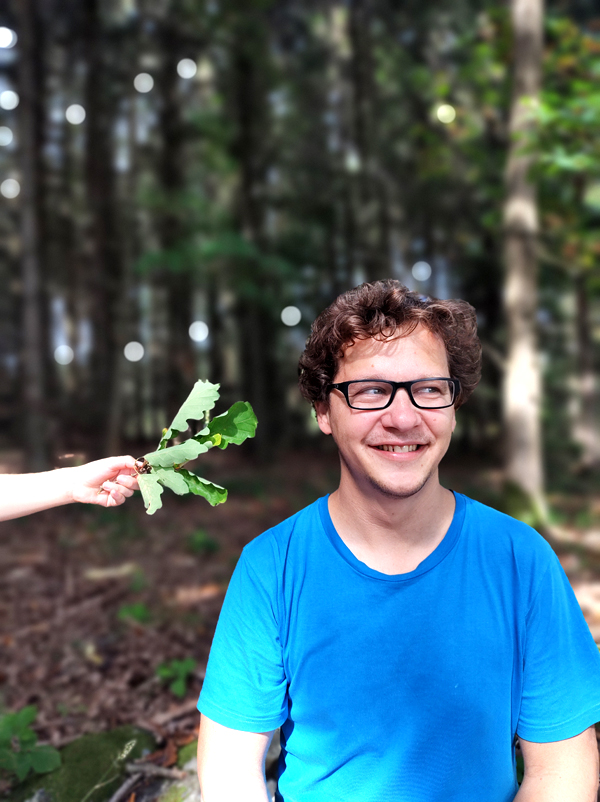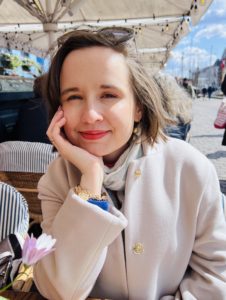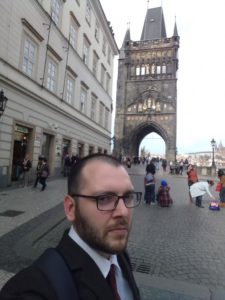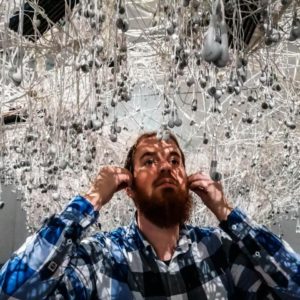Michèle Baussant
Contact: michele.baussant(at)cnrs.fr
is a CNRS researcher appointed at CEFRES since February 2020 within the TANDEM program. She works with Johana Wyss on the TANDEM project she initiated as its PI: “Europe: a Resentful Confederation of Vanquished Peoples? Raw and Lapsed Memories of Post-Imperial (European) Minorities”; which contributes to CEFRES’s research area 1. She is ICM Fellow.
Mátyás Erdélyi
Contact: matyas.erdelyi(at)cefres.cz
is from January 2020 a postdoctoral researcher at CEFRES benefitting from the support of the Charles University in Prague. His research project, entitled Insurance, Banking, and Capitalist Modernity in the Late Habsburg Monarchy, contributes to CEFRES’s research area 1.
Maria Kokkinou
Contact: maria.kokkinou(at)cefres.cz
is from January 2020 a postdoctoral researcher at CEFRES benefitting from the support of the Charles University in Prague within the new TANDEM research project. She is associated at the Faculty of Social Sciences. Her research project, entitled The Europe of Resentment and Rubble: A Confederation of the Vanquished? contributes to CEFRES’s research area 1.
Johana Wyss
Contact: johana.wyss(at)gmail.com
is from February 2020 a part-time researcher at CEFRES within the TANDEM program. She works with Michèle Baussant on the TANDEM project “Europe: a Resentful Confederation of Vanquished Peoples? Raw and Lapsed Memories of Post-Imperial (European) Minorities”.
Associated researchers
Daniel Baric
Contact: daniel_baric(at)yahoo.com
is a former associate professor at the Department of German studies of Tours University. He is currently working at the Department of Slavic studies of Sorbonne University and is since January 2019 associated to CEFRES. His researches focus on cultural transfers and interculturality in Central Europe, especially within the Habsburg Empire, and contributes to research areas 1 and 3.
Ludĕk Brož
Contact: broz(at)cefres.cz
was from February 2018 until January 2020 a part-time senior researcher at CEFRES within the TANDEM program. He worked with Virginie Vaté on the TANDEM project “Bewildering Boar” as its PI. He is since January 2020 associated to CEFRES.
Paul G. Keil
Contact: paul.keil(at)cefres.cz
was in 2019 a postdoctoral researcher at CEFRES and member of the TANDEM project “Bewildering Boar“. His research focuses on human and feral pig relations in Australia. He is since January 2020 associated to CEFRES.
Chiara Mengozzi
Contact: chiara.mengozzi(at)cefres.cz
is, after two years of post-doc at CEFRES, an associate researcher at CEFRES from January 2018. She contributes to CEFRES’s research area 2.
Alexandre Met-Domestici
Contact: a_met_domestici(at)hotmail.com
is from September 2019 an associate researcher at CEFRES. His research project Fighting Money Laundering in the EU and Protecting the EU’s Financial Interests – An Attempt to Define an Integrated Approach contributes to research area 2.
Vincent Montenero
Contact: vincent.montenero(at)cefres.cz
is from September 2019 an associate researcher at CEFRES. His research project Interpersonal and inter-organizational relations within commercial and industrial organizations contributes to research area 1.
Fedora Parkmann
Contact: fedoraparkmann(at)aol.com
is from January 2019 a post-doctoral researcher at the Institute of Art History of the Czech Academy of Sciences and an associate researcher at CEFRES. Her research project, entitled A Transnational Perspective on Czech Social Photography. A Case Study of Czech International Exhibitions from 1933 to 1934 between Germany, France and the USSR contributes to CEFRES’s research area 1.
Františka Schormová
contact: frantiska.zezulakova.schormova(@)cefres.cz
is from 2021 an associated researcher at CEFRES, and currently working on the publication of her PhD thesis defended in December 2020, which title is for now Prague, Red and Black: Early Cold War Journeys, Networks, and Poems. Her researches contribute to CEFRES research area 1.
Clément Steuer
Contact: steuer(@)iir.cz
is from May 2021 associate researcher at CEFRES. His research deals whith political parties systems in the Midle East and in North Africa. He contributes to CEFRES’s research area 1.
Bernhard Struck
Contact: bernhard.struck(@)cefres.cz
is from September 2020 an associate researcher at CEFRES, following his research on German, French, Polish History, the history of travel, borderlands, cartography and space. He works on the project Esperanto and Internationalism, 1880s-1920, which contributes to research area 3.
Virginie Vaté
Contact: Virginie.vate(at)cnrs.fr
is a CNRS researcher. She was appointed at CEFRES from February 2018 until August 2020 within the TANDEM program, working on a research project entitled “Bewildering Boar: Changing Cosmopolitics of the Hunt in Europe and Beyond” with Ludĕk Brož.
Naïs Virenque
Contact: nais.virenque(at)gmail.com
is an associate researcher at CEFRES fromJanuary 2020. Her research project is entitled: Diagrammatic thought in the Middle Ages and in the Early Modern period and contributes to CEFRES’s research area 1.
Benedetta Zaccarello
Contact: benedetta.zaccarello(at)cefres.cz
is a CNRS researcher. After beeing appointed at CEFRES between January 2017 and August 2020, she is now associate researcher at CEFRES. She works on Hybridations of Paradigms and Circulation of Traditions in the Writing of Contemporary Philosophy looking through the manuscript archives of such philosophers as Jan Patočka and Aurobindo Ghose. She intitiated the research project Archives and Multiculturality. Her research is embedded in CEFRES research area 1.

 My main research focuses on representations of the past in digital games, how they are constructed by developers and perceived by players. About 56% of the Czech population regularly play digital games; the average age of a player is 33 years and the share of female players is over 30%. Titles set in the past or inspired by history regularly top the sales charts. However, the content of games is not much talked about in mainstream media, and academic historians have so far ignored them. Recent research shows that the digital games have become an influential historical medium due to their interactivity, performativity and immersion. This new form of popular history actually reflects and influences our historical culture, i.e. ‘how we both collectively and individually think about, understand, negotiate and talk about that past in the present’.
My main research focuses on representations of the past in digital games, how they are constructed by developers and perceived by players. About 56% of the Czech population regularly play digital games; the average age of a player is 33 years and the share of female players is over 30%. Titles set in the past or inspired by history regularly top the sales charts. However, the content of games is not much talked about in mainstream media, and academic historians have so far ignored them. Recent research shows that the digital games have become an influential historical medium due to their interactivity, performativity and immersion. This new form of popular history actually reflects and influences our historical culture, i.e. ‘how we both collectively and individually think about, understand, negotiate and talk about that past in the present’.  This project explores biographical and autobiographical narrative strategies developed by psychoanalysts and describes the varied roles played by biographies, memoirs, and autobiographies within psychoanalytic literature. By analyzing both published and unpublished egodocuments this project introduces and develops the theory of “lifewriting turn” in the history of psychoanalytic literature with a special emphasis on the generic specificity of psychoanalysts’ life writing. Sigmund Freud’s close collaborators such as Fritz Wittels, Helena Deutsch, Siegfried Bernfeld, Marie Bonaparte, Edoardo Weiss, Max Schur, and Theodor Reik, alongside Ernest Jones, have contributed significantly to the reinterpretation and transformation of the genre of biography, memoir, and autobiography in 20th century.
This project explores biographical and autobiographical narrative strategies developed by psychoanalysts and describes the varied roles played by biographies, memoirs, and autobiographies within psychoanalytic literature. By analyzing both published and unpublished egodocuments this project introduces and develops the theory of “lifewriting turn” in the history of psychoanalytic literature with a special emphasis on the generic specificity of psychoanalysts’ life writing. Sigmund Freud’s close collaborators such as Fritz Wittels, Helena Deutsch, Siegfried Bernfeld, Marie Bonaparte, Edoardo Weiss, Max Schur, and Theodor Reik, alongside Ernest Jones, have contributed significantly to the reinterpretation and transformation of the genre of biography, memoir, and autobiography in 20th century.
